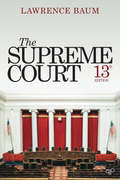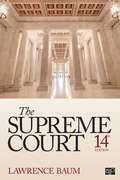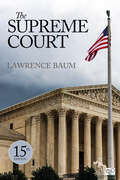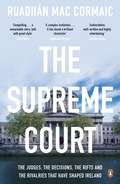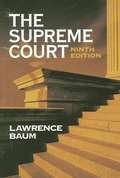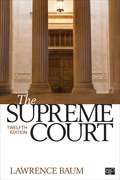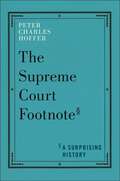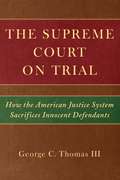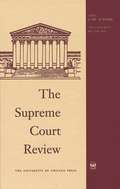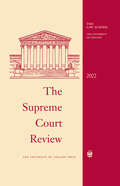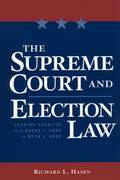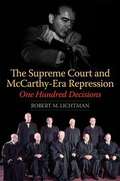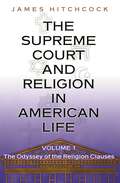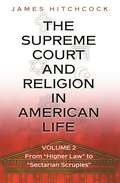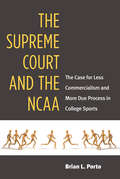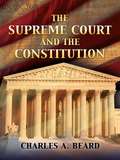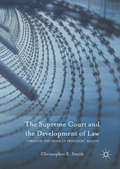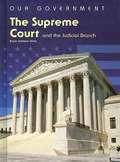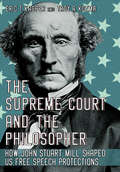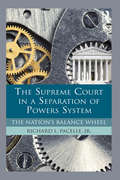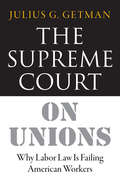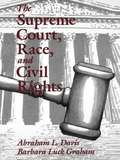- Table View
- List View
The Supreme Court
by Lawrence A. BaumConnecting recent events to their effects on the courts, policy, and society, the Thirteenth Edition of The Supreme Court provides a brief yet comprehensive introduction to the U.S. Supreme Court. In successive chapters, the book examines major aspects of the Court, including the selection, backgrounds, and departures of justices; the creation of the Court's agenda; the decision-making process and the factors that shape the Court's decisions; the substance of the Court's policies; and the Court's impact on government and American society. Delving deeply into personalities and procedures, author Lawrence Baum provides a balanced explanation of the Court’s actions and the behavior of its justices as he reveals its complexity, reach, and influence. Updated with the most recent data displayed in a lively photo program, the new edition of this bestseller is one of the most engaging books on this subject available.
The Supreme Court
by Lawrence A. BaumIn The Supreme Court, Lawrence Baum provides a brief yet comprehensive introduction to the U.S. Supreme Court, one that is balanced and illuminating. In successive chapters, the book examines each major aspect of the Court: the selection, backgrounds, and departures of justices; the creation of the Court′s agenda; the decision-making process and the factors that shape the Court′s decisions; the substance of the Court′s policies; and the Court′s impact on government and American society. Describing the Court′s personalities and procedures, and delving deeply to explain the actions of the Court and the behavior of justices, Baum shows students the Court′s complexity and reach. Tables and figures, plus a lively photo program, make this one of the most engaging books available. It is simply the standard.
The Supreme Court
by Lawrence A. BaumIn The Supreme Court, Lawrence Baum provides a brief yet comprehensive introduction to the U.S. Supreme Court, one that is balanced and illuminating. In successive chapters, the book examines each major aspect of the Court: the selection, backgrounds, and departures of justices; the creation of the Court′s agenda; the decision-making process and the factors that shape the Court′s decisions; the substance of the Court′s policies; and the Court′s impact on government and American society. Describing the Court′s personalities and procedures, and delving deeply to explain the actions of the Court and the behavior of justices, Baum shows students the Court′s complexity and reach. Tables and figures, plus a lively photo program, make this one of the most engaging books available. It is simply the standard.
The Supreme Court
by Lawrence A. BaumIn The Supreme Court, Lawrence Baum provides a brief yet comprehensive introduction to the U.S. Supreme Court, one that is balanced and illuminating. In successive chapters, the book examines each major aspect of the Court: the selection, backgrounds, and departures of justices; the creation of the Court′s agenda; the decision-making process and the factors that shape the Court′s decisions; the substance of the Court′s policies; and the Court′s impact on government and American society. Describing the Court′s personalities and procedures, and delving deeply to explain the actions of the Court and the behavior of justices, Baum shows students the Court′s complexity and reach. Tables and figures, plus a lively photo program, make this one of the most engaging books available. It is simply the standard.
The Supreme Court
by Ruadhán Mac Cormaic'A wonderful book ... a superb book and it's not just for people interested in law; it tells you a lot about Ireland' Vincent Browne, TV3The judges, the decisions, the rifts and the rivalries - the gripping inside story of the institution that has shaped Ireland.'Combines painstaking research with acute analysis and intelligence' Colm Tóibín, Irish Times' Books of the Year'[Mac Cormaic] has done something unprecedented and done it with a striking maturity, balance and adroitness. He creates the intimacy necessary but never loses sight of the wider contexts; this is not just a book about legal history; it is also about social, political and cultural history ... [the Supreme Court] has found a brilliant chronicler in Ruadhan Mac Cormaic' Diarmaid Ferriter, Professor of Modern Irish History, UCD'Mac Cormaic quite brilliantly tells the story ... balanced, perceptive and fair ... a major contribution to public understanding' Donncha O'Connell, Professor of Law, NUIG, Dublin Review of Books'Compelling ... a remarkable story, told with great style' Irish Times'Authoritative, well-written and highly entertaining' Sunday TimesThe work of the Supreme Court is at the heart of the private and public life of the nation. Whether it's a father trying to overturn his child's adoption, a woman asserting her right to control her fertility, republicans fighting extradition, political activists demanding an equal hearing in the media, women looking to serve on juries, the state attempting to prevent a teenager ending her pregnancy, a couple challenging the tax laws, a gay man fighting his criminalization simply for being gay, a disabled young man and his mother seeking to vindicate his right to an education, the court's decisions can change lives.Now, having had unprecedented access to a vast number of sources, and conducted hundreds of interviews, including with key insiders, award-winning Irish Times journalist Ruadhan Mac Cormaic lifts the veil on the court's hidden world.The Supreme Court reveals new and surprising information about well-known cases. It exposes the sometimes fractious relationship between the court and the government. But above all it tells a story about people - those who brought the cases, those who argued in court, those who dealt with the fallout and, above all, those who took the decisions. Judges' backgrounds and relationships, their politics and temperaments, as well as the internal tensions between them, are vital to understanding how the court works and are explored here in fascinating detail.The Supreme Court is both a riveting read and an important and revealing account of one of the most powerful institutions of our state.Ruadhan Mac Cormaic is the former Legal Affairs Correspondent and Paris Correspondent of the Irish Times. He is now the paper's Foreign Affairs Correspondent.
The Supreme Court (9th edition)
by Lawrence BaumBaum (political science, Ohio State U.) presents a short guide for readers who know a lot or a little about the highest court in the US. No dates are noted for earlier editions; this one reflects new scholarship and developments such as the Bush v. Gore case and its repercussions. Cited in Books for College Libraries, 3d. ed. Annotation ©2004 Book News, Inc., Portland, OR (booknews.com)
The Supreme Court 12th edition
by Lawrence BaumThe book examines each major aspect of the Court: the selection, backgrounds, and departures of justices; the creation of the Court's agenda; the decision-making process and the Court's impact on government and American society.
The Supreme Court Footnote: A Surprising History
by Peter Charles HofferA history of the humble footnote and its impact on the highest court in the landIn May 2022, a seismic legal event occurred as the draft majority opinion in Dobbs v. Jackson Women’s Health was leaked. The majority aimed to eliminate constitutional protection for abortion. Amidst the fervor, an unnoticed detail emerged: over 140 footnotes accompanied the majority opinion and dissent. These unassuming annotations held immense significance, unveiling justices’ beliefs about the Constitution’s essence, highlighting their controversial reasoning, and laying bare the vastly different interpretations of the role of Supreme Court Justice.The Supreme Court Footnote offers a study of the evolution of footnotes in US Supreme Court opinions and how they add to our constitutional understanding. Through a comprehensive analysis, Peter Charles Hoffer argues that as justices alter the course of history via their decisions, they import their own understandings of it through the footnotes. The book showcases how the role of the footnote within Supreme Court opinions has evolved, beginning with one of the first cases in the history of the court, Chisholm v. Georgia in 1792 (a case concerning federalism vs. states’ rights) and ending with the landmark Dobbs v. Jackson case in 2022. Along the way, Hoffer demonstrates how the footnotes within these decisions reflect the changing role of the Supreme Court Justice, along with how interpretations of the constitution have transformed over time.At once surprising and revealing, The Supreme Court Footnote proves that what appears below the line is not only a unique window into the history of constitutional law but also a source of insight as to how the court will act going forward.
The Supreme Court On Trial: How the American Justice System Sacrifices Innocent Defendants
by George C. Thomas IIIThe chief mandate of the criminal justice system is not to prosecute the guilty but to safeguard the innocent from wrongful convictions; with this startling assertion, legal scholar George Thomas launches his critique of the U. S. system and its emphasis on procedure at the expense of true justice. Thomas traces the history of jury trials, an important component of the U. S. justice system, since the American Founding. In the mid-twentieth century, when it became evident that racism and other forms of discrimination were corrupting the system, the Warren Court established procedure as the most important element of criminal justice. As a result, police, prosecutors, and judges have become more concerned about following rules than about ensuring that the defendant is indeed guilty as charged. Recent cases of prisoners convicted of crimes they didn't commit demonstrate that such procedural justice cannot substitute for substantive justice. American justices, Thomas concludes, should take a lesson from the French, who have instituted, among other measures, the creation of an independent court to review claims of innocence based on new evidence. Similar reforms in the United States would better enable the criminal justice system to fulfill its moral and legal obligation to prevent wrongful convictions. George C. Thomas III is Professor of Law and Judge Alexander P. Waugh, Sr. , Distinguished Scholar at Rutgers School of Law. "Thomas draws on his extensive knowledge of the field to elaborate his elegant and important thesis---that the American system of justice has lost sight of what ought to be its central purpose---protection of the innocent. " ---Susan Bandes, Distinguished Research Professor of Law, DePaul University College of Law "Thomas explores how America's adversary system evolved into one obsessed with procedure for its own sake or in the cause of restraining government power, giving short shrift to getting only the right guy. His stunning, thought-provoking, and unexpected recommendations should be of interest to every citizen who cares about justice. " ---Andrew E. Taslitz, Professor of Law, Howard University School of Law "An unflinching, insightful, and powerful critique of American criminal justice---and its deficiencies. George Thomas demonstrates once again why he is one of the nation's leading criminal procedure scholars. His knowledge of criminal law history and comparative criminal law is most impressive. " ---Yale Kamisar, Distinguished Professor of Law, University of San Diego and Clarence Darrow Distinguished University Professor Emeritus of Law, University of Michigan
The Supreme Court Review 2011
by The University of Chicago PressFor fifty years, The Supreme Court Review has been lauded for providing authoritative discussion of the Court's most significant decisions. The Review is an in-depth annual critique of the Supreme Court and its work, keeping up on the forefront of the origins, reforms, and interpretations of American law. Recent volumes have considered such issues as post-9/11 security, the 2000 presidential election, cross burning, federalism and state sovereignty, failed Supreme Court nominations, and numerous First and Fourth amendment cases.
The Supreme Court Review, 2022 (Supreme Court Review)
by The University of Chicago PressAn annual peer-reviewed law journal covering the legal implications of decisions by the Supreme Court of the United States. Since it first appeared in 1960, the Supreme Court Review has won acclaim for providing a sustained and authoritative survey of the implications of the Court's most significant decisions. SCR is an in-depth annual critique of the Supreme Court and its work, analyzing the origins, reforms, and modern interpretations of American law. SCR is written by and for legal academics, judges, political scientists, journalists, historians, economists, policy planners, and sociologists.
The Supreme Court and Election Law: Judging Equality from Baker v. Carr to Bush v. Gore
by Richard Hasen&“A pioneering study of the Court&’s increasing efforts to regulate the US political system&” from the author of A Real Right to Vote (Bruce Cain, University of California, Berkeley). In the first comprehensive study of election law since the Supreme Court decided Bush v. Gore, Richard L. Hasen rethinks the Court&’s role in regulating elections. Drawing on the case files of the Warren, Burger, and Rehnquist courts, Hasen roots the Court&’s intervention in political process cases to the landmark 1962 case, Baker v. Carr. The case opened the courts to a variety of election law disputes, to the point that the courts now control and direct major aspects of the American electoral process. The Supreme Court does have a crucial role to play in protecting a socially constructed &“core&” of political equality principles, contends Hasen, but it should leave contested questions of political equality to the political process itself. Under this standard, many of the Court&’s most important election law cases from Baker to Bush have been wrongly decided. &“A must-read for anyone interested in the intersection of law and politics . . . [Hasen&’s] is an important framework against which election law scholars will react and upon which they will build for some time to come.&” —Michigan Law Review &“Hasen engagingly draws on internal Court deliberations, as well as political science and legal theory, to assess and criticize dramatic transformations in the role of constitutional law in overseeing the structure of democracy.&” —Richard H. Pildes, NYU School of Law &“A major contribution to the field of election law.&” —Thomas E. Mann, The Brookings Institution
The Supreme Court and McCarthy-Era Repression: One Hundred Decisions
by Robert M. LichtmanThe 1950s "Red Scare" marks one of the stormiest periods in U.S. Supreme Court history. Robert M. Lichtman provides the definitive history of the high court's decisions in every one of the "Communist" cases it decided, placing each within the context of the time and revealing the broad range and impact of McCarthy-era repression. Making extensive use of the justices' papers, Lichtman examines the dynamics of the Court's changes in direction, from the Vinson Court's rubber-stamping of government action against subversives to the Warren Court's more liberal rulings and the subsequent retreat led by Felix Frankfurter. Lichtman's account details the Court's surprising vulnerability to popular and political attack and reveals the behind-the-scenes relationships and rivalries among justices. At the same time, he recounts in devastating detail the injuries inflicted by McCarthyism on individuals and the nation.
The Supreme Court and Religion in American Life, Vol. 1: The Odyssey of the Religion Clauses (New Forum Books #33)
by James HitchcockSchool vouchers. The Pledge of Allegiance. The ban on government grants for theology students. The abundance of church and state issues brought before the Supreme Court in recent years underscores an incontrovertible truth in the American legal system: the relationship between the state and religion in this country is still fluid and changing. This, the first of two volumes by historian and legal scholar James Hitchcock, provides the first comprehensive exploration of the Supreme Court's approach to religion, offering a close look at every case, including some that scholars have ignored. Hitchcock traces the history of the way the Court has rendered important decisions involving religious liberty. Prior to World War II it issued relatively few decisions interpreting the Religious Clauses of the Constitution. Nonetheless, it addressed some very important ideas, including the 1819 Dartmouth College case, which protected private religious education from state control, and the Mormon polygamy cases, which established the principle that religious liberty was restricted by the perceived good of society. It was not until the 1940s that a revolutionary change occurred in the way the Supreme Court viewed religion. During that era, the Court steadily expanded the scope of religious liberty to include many things that were probably not intended by the framers of the Constitution, and it narrowed the permissible scope of religion in public life, barring most kinds of public aid to religious schools and forbidding almost all forms of religious expression in the public schools. This book, along with its companion volume, From "Higher Law" to "Sectarian Scruples," offers a fresh analysis of the Court's most important decisions in constitutional doctrine. Sweeping in range, it paints a detailed picture of the changing relationship between religion and the state in American history.
The Supreme Court and Religion in American Life, Vol. 2: From "Higher Law" to "Sectarian Scruples" (New Forum Books #34)
by James HitchcockSchool vouchers. The Pledge of Allegiance. The ban on government grants for theology students. The abundance of church and state issues brought before the Supreme Court in recent years underscores an incontrovertible truth in the American legal system: the relationship between the state and religion in this country is still fluid and changing. This, the second of two volumes by historian and legal scholar James Hitchcock, offers a complete analysis and interpretation of the Court's historical understanding of religion, explaining the revolutionary change that occurred in the 1940s. In Volume I: The Odyssey of the Religion Clauses (Princeton), Hitchcock provides the first comprehensive survey of the court cases involving the Religion Clauses, including a number that scholars have ignored. Here, Hitchcock examines how, in the early history of our country, a strict separation of church and state was sustained through the opinions of Jefferson and Madison, even though their views were those of the minority. Despite the Founding Fathers' ideas, the American polity evolved on the assumption that religion was necessary to a healthy society, and cooperation between religion and government was assumed. This view was seldom questioned until the 1940s, notes Hitchcock. Then, with the beginning of the New Deal and the appointment of justices who believed they had the freedom to apply the Constitution in new ways, the judicial climate changed. Hitchcock reveals the personal histories of these justices and describes how the nucleus of the Court after World War II was composed of men who were alienated from their own faiths and who looked at religious belief as irrational, divisive, and potentially dangerous, assumptions that became enshrined in the modern jurisprudence of the Religion Clauses. He goes on to offer a fascinating look at how the modern Court continues to grapple with the question of whether traditional religious liberty is to be upheld.
The Supreme Court and The NCAA: The Case for Less Commercialism and More Due Process in College Sports
by Porto Brian L.Two Supreme Court decisions,NCAA v. Board of Regents(1984) andNCAA v. Tarkanian(1988), have shaped college sports by permitting the emergence of a supercharged commercial enterprise with high financial stakes for institutions and individuals, while failing to guarantee adequate procedural protections for persons charged with wrongdoing within that enterprise. Brian L. Porto examines the conditions that led to the cases, the reasoning behind the justices' rulings, and the consequences of those rulings. Arguing that commercialized college sports should be compatible with the goals of higher education and fair to all participants, Porto suggests that the remedy is a federal statute. His proposed College Sports Legal Reform Act would grant the NCAA a limited "educational exemption" from the antitrust laws, enabling it to enhance academic opportunities for athletes. The Act would also afford greater procedural protections to accused parties in NCAA disciplinary proceedings. Porto's prescription for reform in college sports makes a significant contribution to the debate about how best to address perennial problems in college sports such as cost containment, access to a meaningful education for athletes, and fairness in rule enforcement.
The Supreme Court and the Attitudinal Model Revisited
by Jeffrey A. Segal Harold J. SpaethThis book, authored by two leading scholars of the Supreme Court and its policy making, systematically presents and validates the use of the attitudinal model to explain and predict Supreme Court decision making. In the process, it critiques the two major alternative models of Supreme Court decision making and their major variants: the legal and rational choice. Using the US Supreme Court Data Base, the justices' private papers, and other sources of information, the book analyzes the appointment process, certiorari, the decision on the merits, opinion assignments, and the formation of opinion coalitions. The book will be the definitive presentation of the attitudinal model as well as an authoritative critique of the legal and rational choice models. The book thoroughly reflects research done since the 1993 publication of its predecessor, as well as decisions and developments in the Supreme Court, including the momentous decision of Bush v. Gore.
The Supreme Court and the Constitution
by Charles A. BeardA thorough analysis of the early history and development of judicial review, this is one of the most cited and highly regarded texts on law and government. Author Charles A. Beard ranks among the twentieth century's preeminent judicial and constitutional scholars. His enlightening and accessible survey examines the U.S. high court's role in interpreting and enforcing the laws of the country's framing documents. It addresses the controversies surrounding the exercise of judicial power, and it dismisses charges of the Supreme Court's usurpation of judicial review powers.Beard explores the intentions of the constitution's framers by delving into the records of the Constitutional Convention of 1787 and the text of the constitution itself. He places information from these sources into the context of colonial and republican American life, drawing upon memoirs and correspondence of the day for further insights. This edition of his work is supplemented by an appendix and bibliographies, along with an extensive Introduction, "Charles Beard and the American Debate Over Judicial Review, 1790-1961." Students and scholars of political science, history, and law will find this book an indispensable addition to their libraries.
The Supreme Court and the Development of Law
by Christopher E. SmithThis book illuminates the decision-making processes of the US Supreme court through an examination of several prisoners' rights cases. In 1964, the Supreme Court declined to hear prisoners' claims about religious freedom. In 2014, the Supreme Court heard a case that led to the justices' unanimous endorsement of a Muslim prisoner's religious right to grow a beard despite objections from prison officials. In the fifty-year span between those two events, the Supreme Court developed the law concerning rights for imprisoned offenders. As demonstrated in this book, the factors that shape Supreme Court decision making are well-illustrated by prisoners' rights cases. This area of law illuminates competing approaches to constitutional interpretation, behind-the-scenes interactions among the justices, and the manipulation of legal precedents. External actors also affect the Supreme Court and its decisions when the president appoints new justices and Congress targets the judiciary with legislative enactments. Because of the controversial nature of prisoners' rights issues, these cases serve to illuminate the full array of influences over Supreme Court decision making.
The Supreme Court and the Judicial Branch (Our Government)
by Bryon Giddens-WhiteThis title presents an exciting look inside the judicial branch of the United States government. The book explores topics such as the origins of the judicial branch, the powers and day-to-day responsibilities of Supreme Court justices, historic Supreme Court decisions, and how the judicial branch has shaped the direction of our country.
The Supreme Court and the Philosopher: How John Stuart Mill Shaped US Free Speech Protections
by Eric T. Kasper Troy A. KozmaThe Supreme Court and the Philosopher illustrates how the modern US Supreme Court has increasingly adopted a view of the constitutional right to the freedom of expression that is classically liberal in nature, reflecting John Stuart Mill's reasoning in On Liberty. A landmark treatise outlining the merits of limiting governmental and social power over the individual, On Liberty advocates for a maximum protection of human freedom. Proceeding case by case and covering a wide array of issues, such as campaign finance, offensive speech, symbolic speech, commercial speech, online expression, and false statements, Eric T. Kasper and Troy A. Kozma show how the Supreme Court justices have struck down numerous laws for infringing on the freedom of expression.Kasper and Kozma demonstrate how the adoption of Mill's version of free speech began with Justice Oliver Wendell Holmes Jr. more than a century ago and expanded over time to become the prevailing position of the Court today. The authors argue that this embrace of Mill's rationale has led to an unmistakable reorientation in the Court's understanding of free expression jurisprudence.The Supreme Court and the Philosopher is the first book to comprehensively explore how the political philosophy of Mill has influenced the highest court in the land. In targeting the underlying philosophical reasons that explain why the modern Supreme Court renders its First Amendment decisions, this book is particularly timely, as the issues of censorship and freedom of expression are debated in the public square today.
The Supreme Court in a Separation of Powers System: The Nation's Balance Wheel
by Richard PacelleThe U.S. Supreme Court is not a unitary actor and it does not function in a vacuum. It is part of an integrated political system in which its decisions and doctrine must be viewed in a broader context. In some areas, the Court is the lead policy maker. In other areas, the Court fills in the gaps of policy created in the legislative and executive branches. In either instance, the Supreme Court’s work is influenced by and in turn influences all three branches of the federal government as well as the interests and opinions of the American people. Pacelle analyzes the Court’s interaction in the separation of powers system, detailing its relationship to the presidency, Congress, the bureaucracy, public opinion, interest groups, and the vast system of lower courts. The niche the Court occupies and the role it plays in American government reflect aspects of both the legal and political models. The Court has legal duties and obligations as well as some freedom to exercise its collective political will. Too often those studying the Court have examined it in isolation, but this book urges scholars and students alike to think more broadly and situate the highest court as the "balance wheel" in the American system.
The Supreme Court in the Intimate Lives of Americans: Birth, Sex, Marriage, Childrearing, and Death
by Howard BallPersonal rights, such as the right to procreate--or not-- and the right to die generate dendless debate. Howard Ball shows how the Supreme Court has grappled with the right to reproduce and abort, and takes on the issue of auto-euthanasia and assisted suicide, from Karen Ann Quinlan through Kevorkian and just recently to the Florida case of the women who was paralyzed by a gunshot from her mother and who had pulled the plug on herself. For the last half of the twentieth century, the justices of the Supreme Court have had to wrestle with new and difficult life and death questions for them as well as for doctors and their patients, medical ethicists, sociologists, medical practitioners, clergy, philosophers, law makers and judges. This book offers a look at these issues as they emerged and examines the manner in which the men and women of the U.S Supreme Court adressed them.
The Supreme Court on Unions: Why Labor Law Is Failing American Workers
by Julius G. GetmanLabor unions and courts have rarely been allies. From their earliest efforts to organize, unions have been confronted with hostile judges and antiunion doctrines. In this book, Julius G. Getman argues that while the role of the Supreme Court has become more central in shaping labor law, its opinions betray a profound ignorance of labor relations along with a persisting bias against unions. In The Supreme Court on Unions, Getman critically examines the decisions of the nation's highest court in those areas that are crucial to unions and the workers they represent: organizing, bargaining, strikes, and dispute resolution. As he discusses Supreme Court decisions dealing with unions and labor in a variety of different areas, Getman offers an interesting historical perspective to illuminate the ways in which the Court has been an influence in the failures of the labor movement. During more than sixty years that have seen the Supreme Court take a dominant role, both unions and the institution of collective bargaining have been substantially weakened. While it is difficult to measure the extent of the Court’s responsibility for the current weak state of organized labor and many other factors have, of course, contributed, it seems clear to Getman that the Supreme Court has played an important role in transforming the law and defeating policies that support the labor movement.
The Supreme Court, Race, and Civil Rights
by Abraham L. Davis Barbara Luck GrahamThis text brings examination and analysis of the Supreme Court's role in civil rights, race, and the law into the 21st century with a multidisciplinary, multiperspective approach. It incorporates information from the disciplines of law, political science, and history; provides an analysis of race and law from the perspective of politically disadvantaged groups and brings together Supreme Court readings vital to the understanding of the continuing evolution of civil rights in the United States.
